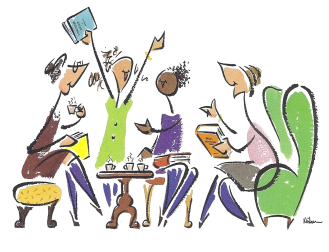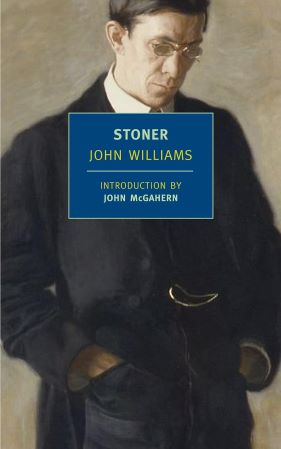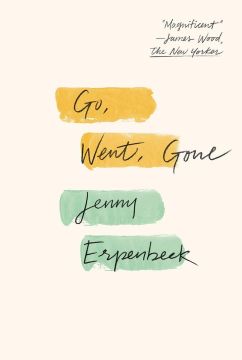What We Talked About When We Talked About Books
- Amanda Holmes Duffy
- February 24, 2025
Reflections on ending a long-running club.

For the past 15 years, I’ve run a book group for Fairfax County Public Library that began by reading the classics. Ten years in, during the pandemic, we moved online with more popular selections. After returning to in-person meetings, we switched our focus to literary award-winners.
Now that I’m spending more time with family in France and Australia, and the library is closing for renovations, our journey has come to an end. So, I asked my fellow members to reflect on favorite books and memorable moments along the way.
First and foremost, we tackled several ambitious novels together:
“Reading War and Peace over two months with companionship was a little like going on a group expedition to a challenging destination. Just the fact that there were others along buoyed my journey. When I was puzzled, there were others to help me along. What a story! It was my favorite read of my favorite book group.”
“One of my favorite experiences…was the reading of Marcel Proust’s In Search of Lost Time. Those who attended shared a feeling of triumph because the book was difficult to understand yet so rich in meaning. We ate madeleines the day of our discussion to celebrate our achievement.”
Personally, I won’t forget reading It Can’t Happen Here after the 2016 election. It was written by Sinclair Lewis in 1935 and imagines the rise of fascist politician Buzz Windrip, who topples American democracy. Yes, you can talk about anything when you talk about books, even politics.
During the pandemic, we met via Zoom, and several members left. Nevertheless, we expanded our reach to include some who had difficulty hearing at in-person meetings and others living further afield:
“It was helpful to have the group keep going on Zoom when covid started. That first time, I could not get in and finally dialed in with the phone, and the first voice I heard was yours, saying you couldn’t get in either, so we were both ‘phoning it in’! It was so good to hear your voice at that time of isolation!”
“One book in particular stood out as a fun, interesting, and meaningful choice to me: Three Men in a Boat (To Say Nothing of the Dog) by Jerome K. Jerome, published in 1889. The book is considered among other things a comic gem, travelogue, and lament to Imperial Britain...I remember laughing through parts and loving the detailed and beautiful descriptions of the trips down the river and the interesting places along the banks. I looked forward to our group discussion and was not disappointed. We had a rich and long discussion that covered so many topics, such as friends in youth, [the] absurdity of existence, camping trips, playing truant, comic songs, and the lovely memories of lost time in beautiful settings.”
As facilitator, I think Zoom suited me well. I spent three months with my son and family, who live in Australia, without missing a single discussion — although the time difference meant a 6 a.m. start time for me. Prior to logging in for my final Australian Zoom session, my daughter-in-law gave birth to a third child, and the book-club members were naturally the first to hear the news!
Another time, to everyone’s amusement, I ran the discussion from a hotel balcony at a beach resort in the Dominican Republic.
After covid, we moved back to the library, and it was great to meet in person again:
“I learned so much from other people when we had all read the same book! Different life experiences mean different viewpoints; something leaps out to a few of us, while others run right over it, and vice versa — except it isn’t really versa because there are more than two sides to every question and observation.”
“Many of the books we read for the club had been made into movies, such as Brooklyn and Erasure. It was delightful to be able to relate the depth of the author’s story to the cinematic portrayal of the essence of the story — it makes me want to read the books before, during, or after seeing the movie.”
Shaping our discussion was a bit like flying a kite. I’d throw out a prompt, and if a current caught, slacken my hold and let conversation soar. If we went off topic, I reined it back in. I learned to trust the buoyancy of the most energizing and interesting ideas we found in the books:
“Each person in the book club brings to the discussion their history and point of view, which could be very different from mine. For example, when we discussed the book Foster, some members of the group felt that we were being too judgmental toward the alcoholic father. On the other hand, when we read Brooklyn, members of the group who had grown up in New York connected with it in a way that I didn’t but shared their memories. When we read Demon Copperhead, having grown up in the South, I connected to it in a way that I don’t think others did. During the discussions, each of us shared our various points of view, which enriched the reading of the books.”
“I loved our book group — kept me plowing through books I wanted to put down, and then voila, I realized I liked them! I loved hearing others’ insight, which so often was so different than mine — this kept me more open-minded (I hope) and gave me new perspectives. I especially loved The Known World, which I still think about.”
I also learned that the facilitator should keep her negative feelings to herself. I was taken to task — and rightly so — for sharing my dislike of John Updike. It was unfair to the participants who came to the discussion full of enthusiasm:
“I also think we were extremely lucky to have an accomplished moderator for the group. I’ve been in book groups without a ‘neutral’ moderator, where books are chosen by group members saying X is one of their favorite books. It makes it hard, then, to have an open discussion because it feels like we’re trampling on someone’s favorite book. Having the books neutrally chosen and then the discussion moderated by someone who was knowledgeable and sometimes didn’t care for [a] particular book and other times really liked it provided an atmosphere where we could all be frank with our views, as well, which made for more insightful discussions.”
We chose our selections democratically — but based on library holdings so nobody needed to purchase a book. Our librarian’s guidance was a real bonus:
“As another person who leads book clubs, I will share that readers are often positively surprised to realize how much they learn from a discussion about a book they ‘didn’t like’... Even when ‘all of us’ ultimately don’t think a book was that great, we learn from the nuances of a deep conversation that builds connections between us, as well as enlightening us to alternative perspectives.”
Finally, we made wonderful personal connections and friendships:
“It’s been life-enriching to participate in our book groups. Our discussions transformed us from individuals into a community of readers. I have learned a lot and I have made close friends, too. We may have started out as strangers, but now we know each other well.”
Amanda Holmes Duffy is a columnist and poetry editor for the Independent and the voice of “Read Me a Poem,” a podcast of the American Scholar.

